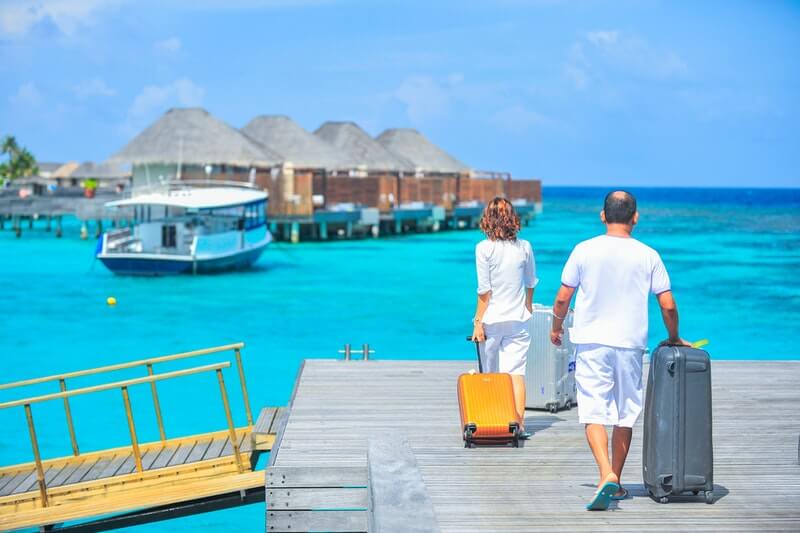No products in the cart.
Can You Fit More in a Hard or Soft Suitcase?

Whether one should buy a hard or soft suitcase has always been a conundrum for travelers. It doesn’t matter if you’ve just decided to travel again, jetting off every so often, or are a seasoned flier. (Image Credits: Asad photo Maldives/Pexels)
Here are a few factors to consider before buying a soft or hard suitcase. By learning them, you should have exactly the piece of luggage you need for your next flight.
Considerations for Buying a Hard or Soft Suitcase
Have trouble deciding between these two luggage options? Identify your needs before making that purchase.
1. How much stuff are you bringing?
Most of today’s hard-shell luggage pieces can make it difficult for any traveler to fit extra items. While it’s true that some versions, like those made of polycarbonate, are expandable, they still can’t stretch more than a soft case.
Maneuverability is also a strong suit for soft-shell luggage pieces. Unlike hard cases, you can usually squeeze them into small spaces without competing with other bags.
2. Do you prefer two or four wheels?
A hard case is generally easier to manipulate in bus terminals, train stations, and airports since they mostly come with four wheels. Four wheels are a standard in hard cases, while in soft cases, they are harder to find.
Also, since these bags have wheels with 360-degree rotation, they don’t drag or flip easily, even when at full capacity. This is a huge advantage for those who have to hop from one flight to another and are carrying heavy luggage.
3. Have there been some changes?
According to Handy Travel Mates, companies no longer make hard suitcases like they used to. But is this a good or a bad thing? It’s definitely a good thing because hard-shell pieces used to break more easily than soft-shell luggage.
Today, manufacturers have leveled-up the overall quality of their products. They now use soft and durable materials like polycarbonate to create hard suitcases that flex and absorb impact when dropped onto solid surfaces.
Another thing that’s great about polycarbonate is that it’s lightweight and scratch-proof. This is why you’ll find some hard suitcases in the market to be lighter than soft-shell ones.
4. Are you carrying anything fragile?
The number of gadgets travelers typically haul from one country to another these days makes durability a number one priority in the modern travel scene. Think about it: you’re constantly traveling with your iPads, laptops, cameras, and other flimsy electronic devices.
Hard-shell cases are usually more appropriate for when you’re bringing delicate electronics. While most cases aren’t completely resistant to the elements, hard-shell luggage is definitely easier to protect from the rain and snow.
5. How do you feel about cleaning?
If you’re traveling to places with bad weather, picking luggage that’s easy to clean is a must. Ease of cleanliness is usually a quality held by hard-shell luggage pieces since they have a more durable shell that, for the most part, keeps moisture at bay. Soft cases typically aren’t as moisture resistant, and they tend to develop smells and stains easily.
6. How important is it for you to organize?
Where accessibility is concerned, soft-shell cases have the edge. They usually have pockets on the front, which is extremely convenient if you need to reach for items you like to keep handy. These could be anything from extra clothes to magazines and toiletries.
Organizing stuff is even more important when you’re traveling with babies. You may need to keep an extra diaper, toy, pacifier, or change of clothes within reach just in case. For this, you can rely on some of the outside pockets of a soft-shell luggage piece.
7. Are you scared of losing your luggage?
Who isn’t, right? Besides, this happens more times than you think, so it’s best to come prepared. Hard suitcases usually come in a more diversified range of colors and patterns, making them easier to spot in a sea of blacks, whites, and neutrals. While soft cases also deliver shade variety, their colors tend to get masked by dirt, grime, and the general wear and tear that results from excessive traveling.
Customization is most felt as an advantage when you opt for hard suitcases. This is because they’re more durable and can retain personal specifications for a longer time.
So, Which Is It Going to Be, a Soft or Hard Suitcase?
Hard and soft suitcases have their own pros and cons, depending on your preferences and travel needs. If you’re planning to pack a lot of items or do a lot of shopping, then the more expandable soft suitcase would usually be the better choice.
On the other hand, a soft-shell case wouldn’t be a good choice if you’re packing fragile electronics or traveling to some of the wetter parts of the globe. So, identify your needs first and do your research before making your decision.















Leave a Reply